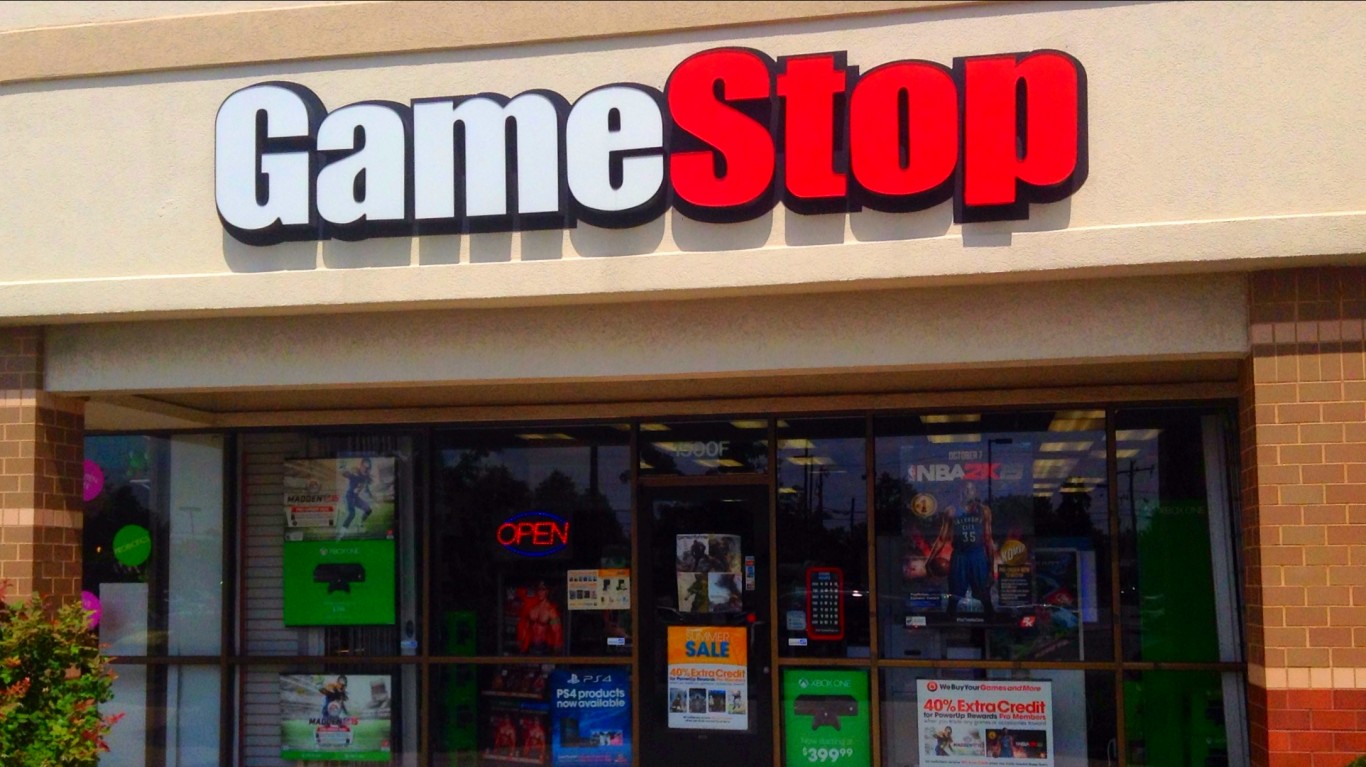
On July 1 of last year, GameStop Corp. (NYSE: GME) shares closed at $4.44. By the end of the year, the stock closed at $18.84 per share. A 300% share price increase in just six months was remarkable — and irresistible to some big investors. By January 15 of this year, GameStop had 41.82 million floated shares and roughly 150% of that total was sold short. That’s not a typo.
On January 27, 2021, GameStop shares closed at $347.51 and the next day set an all-time high of $483.00 before closing lower.
Looking at the same dates, AMC Entertainment Holdings Inc. (NYSE: AMC) closed at $4.57 on July 1 and at $2.12 on December 31. Shares had dropped about 50% at the same time that GameStop added 300%. Short interest in AMC on January 15 was about 26% of the stock’s total float, around 45 million of nearly 170 million floated shares. On January 27, AMC stock closed at $19.90, after jumping from an opening price of $4.96, roughly the same size as GameStop’s jump for the day. The stock climbed even higher in early June to set an all-time high of $72.62.
The primary reason for the huge jump in January was a short squeeze. Retail investors, many of whom, read and wrote comments about the stocks on Reddit’s WallStreetBets subgroup, forced investors with large short positions to cover their bets, driving the shares to unprecedented highs. Markets adjusted by early June of this year, and since then, AMC is down about 11.5% and GameStop is down about 41.5%.
Where will the two OG meme stocks go from here? We thought we’d take a look at the outlook for the two stocks going into a new year.
Over the past four quarters, GameStop has beaten revenue estimates three times and missed earnings per share estimates three times. The company has $1.4 billion in available cash and equivalents and net debt of around $754 million.
What it doesn’t have is a lot of interest from analysts. Just three cover the stock, and their price targets range from a low of $24 to a high of $45 with a median of $34.50. That implies an expected decline of around 76% in GameStop’s share price.
And a short squeeze is unlikely to come to the rescue this time. According to Fintel data, short interest in GameStop is at 10.4% of the float, its lowest level of the year.
The company appears to be loading up on hardware while reducing the role of software in its revenue stream. New software games once accounted for more than 40% of the company’s revenue, compared to the current level of around 33% for both new and used software.
Free cash flow in the most recent quarter was a negative $306.2 million. That hardware inventory is expensive, and the company has yet to offer details of how it intends to regain a positive cash flow.
Turning to AMC, the recent boost in movie attendance thanks to “Spider-Man: No Way Home” has added nearly 18% to the stock price since the beginning of the month. But since November 26, the shares are down more than 23%, even including the December increase.
Revenue was up in three of the last four quarters but remains down sharply from 2019 levels. As was the case with GameStop, earnings per share were up in three of the past four quarters.
Of eight analysts covering the stock, six have a Sell or Strong Sell rating on the shares, and the other two rate the stock at Hold. A median price target of $6 implies a decline of more than 79% from a recent price of around $29.20.
While AMC’s short interest as a share of the total float is still elevated at around 16.3%, that likely is not high enough to force a short squeeze.
AMC has burned about $1.1 billion in cash over the past four quarters, although the most recent quarter’s cash burn of $143.8 million was easily the smallest. The latest surge in coronavirus cases caused by the Omicron variant could stifle the cash flow gains the company has made if the surge persists.
One final note on AMC: free popcorn, exclusive NFTs and accepting cryptocurrencies are not going to turn the company around.
Shortly before noon Monday, AMC traded up about 2.5% to $29.22, in a 52-week range of $1.91 to $72.62. The average daily trading volume is around 44.6 million shares, and more than 18 million had traded thus far on the day.
GameStop traded down about 2.7%, at $148.00 in a 52-week range of $17.08 to $483.00. The average daily trading volume is around 2.4 million shares, and just over 1 million had traded shortly before noon Monday.
Are You Still Paying With a Debit Card?
The average American spends $17,274 on debit cards a year, and it’s a HUGE mistake. First, debit cards don’t have the same fraud protections as credit cards. Once your money is gone, it’s gone. But more importantly you can actually get something back from this spending every time you swipe.
Issuers are handing out wild bonuses right now. With some you can earn up to 5% back on every purchase. That’s like getting a 5% discount on everything you buy!
Our top pick is kind of hard to imagine. Not only does it pay up to 5% back, it also includes a $200 cash back reward in the first six months, a 0% intro APR, and…. $0 annual fee. It’s quite literally free money for any one that uses a card regularly. Click here to learn more!
Flywheel Publishing has partnered with CardRatings to provide coverage of credit card products. Flywheel Publishing and CardRatings may receive a commission from card issuers.
Thank you for reading! Have some feedback for us?
Contact the 24/7 Wall St. editorial team.

 24/7 Wall St.
24/7 Wall St.



